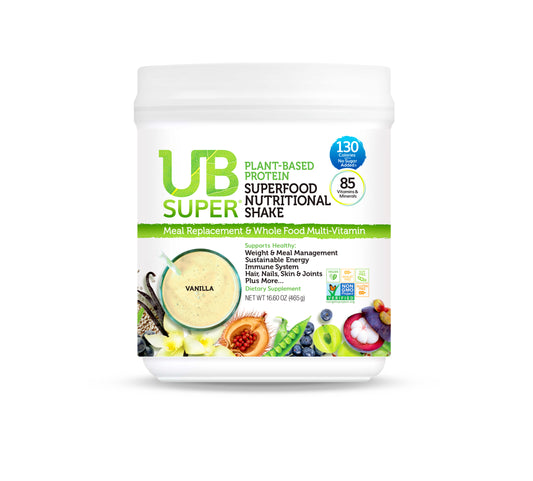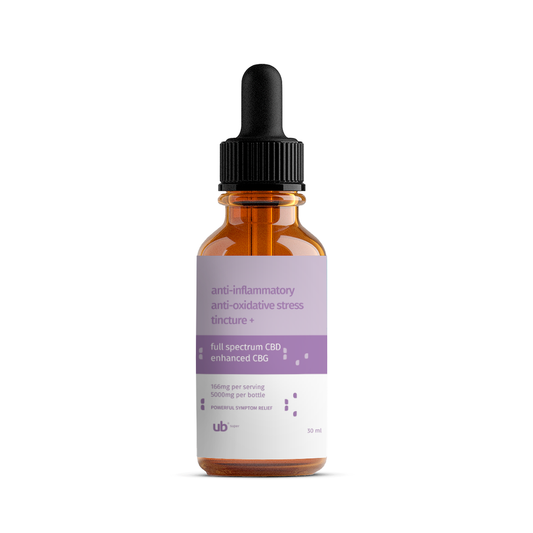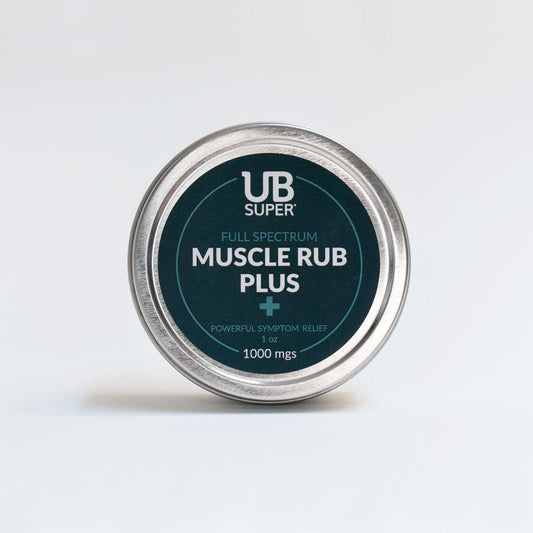Ingredients Smoothie
UB Super Plant-Based Protein Smoothie Ingredients
Click through the list below to see the incredible and often proprietary ingredients in our protein superfood nutritional shakes.
- PROTEINS
- SUPERFOODS
- B VITAMINS
- HYALURONIC ACID
- FULVIC ACID
- DIGESTIVE ENZYMES
- PREBIOTICS & PROBIOTICS
- AMINO ACIDS
- GLOSSARY
- LEGAL
PROTEINS
Proteins are large molecules made up of 20 standard amino acids. The human body can produce 11 amino acids, with the remaining nine coming from the diet.
Proteins are the foundational building blocks for cells and tissues, including bones, muscles, cartilage, skin, and blood. They are responsible for kick-starting your metabolism, and contribute to the creation of enzymes, hormones, and vitamins. Lean proteins—those low in saturated fat and cholesterol—provide the calories necessary to fuel an active lifestyle.
UB Super contains the highest quality proteins to promote muscle growth and repair.
UB Super Plant-Based Protein Smoothie contains:
Yellow Pea
Yellow peas are an excellent source of dietary fiber and protein. They are rich in the amino acid tryptophan, which necessary for manufacturing serotonin, another amino acid that improves mood and regulates appetite, hunger, and sleep. Yellow peas are also high in vitamin B1 and B9, phosphorus, potassium, molybdenum, and manganese.
The benefits of yellow pea include:
- Promotes healthy blood sugar
- Cardiovascular health
- Supports optimal cholesterol levels
- Digestive regularity
- Metabolic health
- Healthy weight
Hemp Seed
Hemp seed provides sustainable energy through an abundance of easily digested plant protein. It contains vitamins B1 and B2, vitamin C, vitamin E, beta-carotene, calcium, magnesium, phosphorus, and potassium. Additionally, hemp seed is an excellent source of omega fatty acids, fiber, antioxidants, and minerals.
The benefits of hemp seed include:
- Anti-inflammatory
- Bone health
- Cardiovascular health
- Digestive health
- Mental clarity
- Skin and hair support
Quinoa
Quinoa is one of the healthiest and most nutritionally dense foods around. High in fiber, vitamin B2, vitamin E, iron, calcium, copper, phosphorus, potassium, magnesium, manganese, and zinc, quinoa is a gluten-free seed. It is one of the few plant sources that provide a complete protein, meaning it contains all nine essential amino acids. Quinoa also contains a high amount of the beneficial amino acids lysine and isoleucine.
The benefits of quinoa include:
- Antioxidant properties
- Supports blood sugar
- Metabolic health
- Healthy weight
Pumpkin Seed
Also known as the pepita, pumpkin seeds are an incredible source of key minerals, including iron, magnesium, manganese, phosphorus, and zinc. They are good sources of B2 (riboflavin), niacin, potassium, and naturally occurring sodium. Plus, pumpkin seed oil provides a vegan source of essential fatty acids, namely the omega-3s linoleic and linolenic acids. Better yet, pumpkin seeds are an amazing vegan source of protein, containing 5 grams of protein in just two tablespoons.
The benefits of pumpkin seed include:
- Antioxidant
- Blood sugar support
- Cardiovascular health
- Hormone balance
- Prostate health
- Skin and hair health
Flaxseed
Often referred to as “the most powerful plant food in the world,” flaxseed contains a wide range of nutrients, most notably including B1 (thiamine), B6, iron, magnesium, phosphorus, and zinc. It is also a good source of B2 (riboflavin), niacin, pantothenic acid (B5), calcium, and potassium.
Flax is also an incredible source of soluble fiber, and is one of the few plant foods that are considered a complete protein, meaning it contains all nine essential amino acids. Just one tablespoon of flaxseed contains 2-3 grams of protein!
But where flaxseed gets it powerhouse health benefits from lie in its rich stores of essential fatty acids and lignans. Flax is one of the best sources of vegan omega-3 fatty acids, specifically alpha linolenic acid (ALA). When it comes to lignans—plant compounds known to have both antioxidant and mildly estrogenic properties—flax contains anywhere from 75 to 800 times more lignans than other plant foods on the planet.
The benefits of flaxseed include:
- Blood sugar
- Breast cancer protection
- Cardiovascular health
- Digestive health
- Hormone balance
- Joint health
- Skin and hair health
- Weight maintenance
SUPERFOODS
A superfood is a nutrient-dense food that promotes health and well being. Superfoods tend to be higher in antioxidants, fiber, vitamins, and minerals than your average grocery store fruits and vegetables. That’s why UB Super superfoods are globally sourced from the lushest environments around the world.
One of the greatest benefits of superfoods lay in their antioxidant benefits. Antioxidants are phytonutrients that significantly decreases the adverse effects of oxidation, a process of physical wear and tear accelerated by stress, pollution, smoking, and alcohol. Oxidation can lead to free radical damage, which has been linked to inflammation and poor health in general. Antioxidants work to prevent free radical damage, support the immune system, and promote overall health.
The super foods found in UB Super include:
Acerola Cherry
Acerola | Malpighia emarginata
Origin: Amazon Rain Forest
Acerola cherry is extremely rich in vitamin C, and is a good source of vitamins A, B1, B2, and B3, as well as carotenoids and bioflavonoids. Acerola supports optimal heart health form collagen for the development of new and healthy skin cells.
Cacao
Cacao | Theobroma cacao
Origin: Central and South America
Cacao is high in copper, manganese, zinc, and vitamin B5, and antioxidants called flavonoids, thought to support healthy cell growth, improved blood flow, and overall heart and brain health.
Organic Maca Root
Maca | Lepidium peruvianum or Lepidium meyenii
Origin: Peru
Maca root is one of the most traditionally used and valued Peruvian herbs, contains a number of minerals, vitamins, fatty acids, plant sterols, amino acids, and alkaloids, among other phytonutrients. In terms of minerals, calcium makes up 10 percent of maca’s mineral content. Magnesium, phosphorus, and potassium are also present in significant amounts. Maca also contains a number of vitamins and amino acids, including B1, B2, B12, vitamin C, vitamin E, and quercetin, as well as arginine, lysine, tryptophan, tyrosine, and phenylalanine. Maca has many health benefits, including relieving menopausal symptoms; stimulating and regulating the endocrine system (adrenals, thyroid, ovaries, and testes); increasing energy, stamina, and endurance; regulating and normalizing menstrual cycles; and balancing hormone levels.
B VITAMINS
B vitamins are essential to the process of converting food into fuel, generating energy to power an active lifestyle. The benefits of the B-vitamin family range from maintaining memory to the production of red blood cells and supporting healthy blood sugar levels.
The targeted B vitamins for UB Super are sourced from Orgen Family. Orgen is a 100% USDA certified organic and all natural, food-based source of vitamins and mineral derived from organic fruits, vegetables, and botanicals.
Biotin:
Biotin is one of the 13 vitamins that make up the B complex. It is involved in the metabolism of fats, carbohydrates and protein, as well as the formation of fatty acids. UB Super derives biotin (vitamin B7) from agati (a small, thin, flat fruit from the hummingbird tree).
The benefits of biotin include:
- Blood sugar support
- Hair and skin health
- Normal production of nerve tissue, bone marrow, and blood cells
Vitamin B12:
Vitamin B12 is comprised of a class of related, water-soluble compounds, namely methyl-, hydroxyl- and cyanocobalamin (among others). B12 is involved in DNA synthesis and regulation in every cell of the body. It also plays a role in energy production and synthesis of fatty acids. UB Super uses the methylcobalamin form of vitamin B12.
The benefits of B12 include:
- Blood sugar
- Bone health
- Brain health
- Digestion
- Heart health
- Hormone health
- Vision
VEGAN HYALURONIC ACID
Hyaluronic acid (HA) is a glycosaminoglycan (GAG) found throughout your body, primarily concentrated in the fluids of the eyes and joints as well as the skin. Proper levels of hyaluronic acid are essential for the maintenance and repair of connective tissue throughout the body, including collagen and cartilage.
Hyaluronic acid is typically sourced from animal sources such as rooster combs, but the hyaluronic acid used in UB Super is vegan, sourced from non-GMO soy and corn.
Fulvic Acid/Minerals
Aggressive farming, erosion, and chemicals have depleted the microorganisms and minerals in soil, which are necessary for optimal nutrient absorption. UB Super provides fulvic acid and minerals to supplement the deficiencies in a modern diet.
Fulvic Acid
Fulvic acid is one of the main components of humus—the dark, nutrient-rich organic soil layer. It is considered organic because it is comprised on partially decomposed plant and animal matter. Because of environmental damage, fulvic acid is no longer present in the foods we eat.
Fulvic acid contains more than 77 macro and trace minerals, most of which occur in their ionic form. This means that they are masters at conducing electricity and aiding in absorption. That means fulvic acid is capable of transporting energy between cells and can receive or donate electrons, prevent free radical damage, and increase the bioavailability of nutrients, namely minerals.
Minerals
At one point in time, plants were able to effectively draw minerals from the soil and make them available for human consumption. Due to changes in the environment, our food sources are frequently deficient in minerals. Minerals are essential to the function of every chemical and electrical process in the body.
UB Super contains all the major dietary minerals, including calcium, magnesium, phosphorus, potassium, sodium, and sulfur. It also contains a number of trace minerals, including:
Antimony
Barium
Beryllium
Bismuth
Boron
Bromide
Carbon
Cerium
Carbonate
Cerium
Cesium
Chloride
Chromium
Cobalt
Copper
Dysprosium
Erbium
Europium
Fluoride
Gadolinium
Gallium
Germanium
Gold
Holmium
Indium
Iodine
Iridium
Iron
Lanthanum
Lithium
Lutetium
Manganese
Molybdenum
Neodymium
Nickel
Niobium
Osmium
Palladium
Platinum
Phosphorus
Praseodymium
Rhenium
Rhodium
Rubidium
Ruthenium
Scandium
Selenium
Silicon
Silver
Strontium
Tantalum
Tellurium
Terbium
Thallium
Thorium
Thulium
Tin
Titanium
Tungsten
Vanadium
Ytterbium
Yttrium
Zinc
Zirconium
Digestive Enzymes
Your body needs digestive enzymes to break down the food you eat into accessible nutrients to sustain your body. Without adequate enzyme availability, your digestion can be limited—leaving you with nagging discomfort (in the form of gas, bloating, and indigestion) and poor nutrition.
While all fresh fruits and vegetables contain some level of natural digestive enzymes, several are produced in the pancreas. UB Super contains six separate digestive enzymes, including:
- Amylase—Digests starch (complex carbs) into glucose
- Cellulase—Digests fiber
- Phytase—Digests seeds and grains
- Protease—Digests protein into free amino acids
- Lactase—Digests lactose (milk sugar) into glucose and galactose
- Lipase—Digests dietary fat
Prebiotics & Probiotics
Prebiotics are fibers that feed good bacteria—probiotics—in the digestive tract. Prebiotics are proven to support gastrointestinal health by providing the fuel necessary to create probiotics. UB Super contains two prebiotics:
- Inulin—improves calcium and magnesium absorption
- Fructooligosaccharide (FOS)—improves mineral absorption and supports health cholesterol
Probiotics are microorganisms that help offer protection from harmful bacteria in the digestive tract. Together, prebiotics and probiotics can support a wide variety of digestive health concerns, as well as support immunity. UB Super contains four probiotics:
- L. acidophilus—Maintain digestive and lung health
- L. rhamnosus—Promote immunity and digestive health
- B. bifidum—Maintain digestive and lung health
- B. longum—Supports healthy pH in the intestines and digestive tract
Amino Acids
Amino acids are organic compounds that combine to form proteins. Consuming a variety of amino acids throughout the day is vital for a balanced and healthy metabolism. There are three groups of amino acids: non-essential, essential, and conditional.
Non-Essential
Called “non-essential” simply because the human body can synthesize them, the non-essential amino acids are just as important as the other amino acids for creating protein. UB Super contains four non-essential amino acids:
- Alanine
- Asparagine
- Aspartic acid
- Glutamic acid
Essential
Called “essential” because the human body cannot synthesize them, these amino acids must be obtained from diet. UB Super contains nine essential amino acids:
- Histidine
- Isoleucine
- Leucine
- Lysine
- Methionine
- Phenylalanine
- Threonine
- Tryptophan
- Valine
Conditional
“Conditional” amino acids are necessary when the body is experiencing stress or illness. UB Super contains eight conditional amino acids:
- Arginine
- Cysteine
- Glutamine
- Glycine
- Ornithine
- Proline
- Serine
- Tyrosine
Nutrient Glossary
Amino acid – The basic structural unit that makes up a protein.
Anthocyanins – Part of the flavonoid family, anthocyanins are highly concentrated in the pigments of berries and cherries, giving them their bright vivid colors.
Antioxidant – A molecule that inhibits the oxidation of other molecules. Oxidation produces free radicals within our body that produce chain reactions of cell damage.
Bioflavonoids – Interchangeable term for flavonoids.
Carotenoids – These organic pigments in plants absorb light and come in more than 600 variations.
Casein – A protein found in milk that is responsible for many dairy allergies.
Electrolyte – A substance that promotes electrical flow within the body and is responsible for proper muscle and nerve function.
Essential fatty acids – A fatty acid that is required for biological processes, but cannot synthesize. A human body must ingest omega-3 and omega-6 essential fatty acids.
Fatty acids – Important sources of fuel that produce large levels of ATP (adenosine triphosphate), which transfers energy amongst cells and is preferred by heart and skeletal muscles.
Flavonoids – The most common type of polyphenolic compound; serves as an antioxidant.
Folate – A term that designates the natural form of folic acid (vitamin B9).
Folic acid – Also known as vitamin B9, it is needed by the body to synthesize DNA.
Free radical – Unstable molecules that produce cell damage. Known producers of free radicals are smoking, excessive alcohol consumption, radiation, contact with pesticide/herbicides, and other environmental factors.
Lipoprotein – “Bad” low-density lipoprotein (LDL) can contribute to plaque buildup, clot formation, and hardening of the arteries. “Good” high-density lipoprotein (HDL) removes LD from the artery walls and carries it back to the liver, where it gets broken down for removal.
Micronutrient – An element or substance in nature that the body requires in small trace amounts for proper growth and development.
MK-7 – xxx
Omega 3 (alpha linolenic acid, ALA) – Needed by the human body to support healthy blood clotting and build cell membranes in the brain.
Omega 6 (alpha linolenic acid, ALA) – Supports healthy cholesterol and inflammation, and helps maintain overall heart health.
Omega 9 (oleic acid) – The body can produce omega-9 fatty acid, though it is still beneficial to obtain them through food. Omega 9s help maintain healthy cholesterol, boosts HDL (good) cholesterol, and promotes good circulation and arterial health.
Phytonutrient – A substance found in certain plants that is beneficial to cellular function.
Phytosterols – Cholesterol-like molecules found in plants that help reduce cholesterol absorption, which works to maintain healthy cholesterol levels.
Polyphenols – A type of micronutrient that functions as an antioxidant within the body to protect cells from free radical damage.
Polysaccharides – A type of carbohydrate, this starch provides the body with energy and enhanced digestion.
Protein – Large molecules of amino acids that are responsible for almost every process within your body, along with being a fuel supply.
Superfood – A food that is nutrient-dense, providing higher than normal levels of antioxidants, along with having health-promoting properties.
Theobromine – Similar to caffeine, theobromine has stimulating, yet relaxing, effects at a lower level.
Vitamin D3 – Vitamin D3 has several important functions, including regulating the absorption of calcium and phosphorous and facilitating normal immune system function. Common food sources include oily fish and dairy products. One of the few (if not only) vegan sources of vitamin D3 can be found in lichen.
Vitamin K – This fat-soluble vitamin has two main sub-types: K1 and K2. K2 is the form most commonly found in animals and has several subtypes known as menaquinones, of which there are at least 11 different subtypes. Of these, the most commonly studied are menaquinone-4 and menaquinone-7. Menaquinone-7 is believed to be the most bioavailable and longest lasting form of Vitamin K.
Xanthones – This organic yellow pigment in fruit is known to promote a healthy inflammatory response and balanced mood.
LEGAL
Disclaimer:
This ingredient information is provided to you by UB Super® for educational purposes under Section 5 of the Dietary Supplement Health and Education Act of 1994 and is not intended as medical advice. Consult your healthcare professional or other reliable resources for additional information.
References:
- http://www.livestrong.com/article/280194-what-are-the-benefits-of-pea-protein/.
- https://authoritynutrition.com/6-health-benefits-of-hemp-seeds/.
- https://authoritynutrition.com/11-proven-benefits-of-quinoa/.
- https://ods.od.nih.gov/factsheets/list-Botanicals/.
- http://www.ars.usda.gov/aboutus/docs.htm?docid=4142.
- https://ods.od.nih.gov/factsheets/VitaminB12-Consumer/.
- Sanmanee N and Areekijseree, M. Biol Trace Elem Res. 2010 Jun;135(1-3):162-73.
- https://www.nlm.nih.gov/medlineplus/ency/article/002222.htm.
- http://www.webmd.com/diet/features/benefits-of-flaxseed#1.
Featured Products
-
Plant-Based Protein Superfood Nutritional Shake (Vanilla)
Regular price $54.00 USD $48.60Regular priceUnit price per -
Plant-Based Protein Superfood Nutritional Shake w/ Full Spectrum Hemp Extract
Regular price $89.00 USD $80.10Regular priceUnit price per -
Full Spectrum Enhanced CBG Anti-Inflammatory Anti-Oxidative Stress Tincture+
Regular price $138.00 USDRegular priceUnit price per -
Full Spectrum Muscle Rub Plus - 1000 MG
Regular price $52.00 USDRegular priceUnit price per




